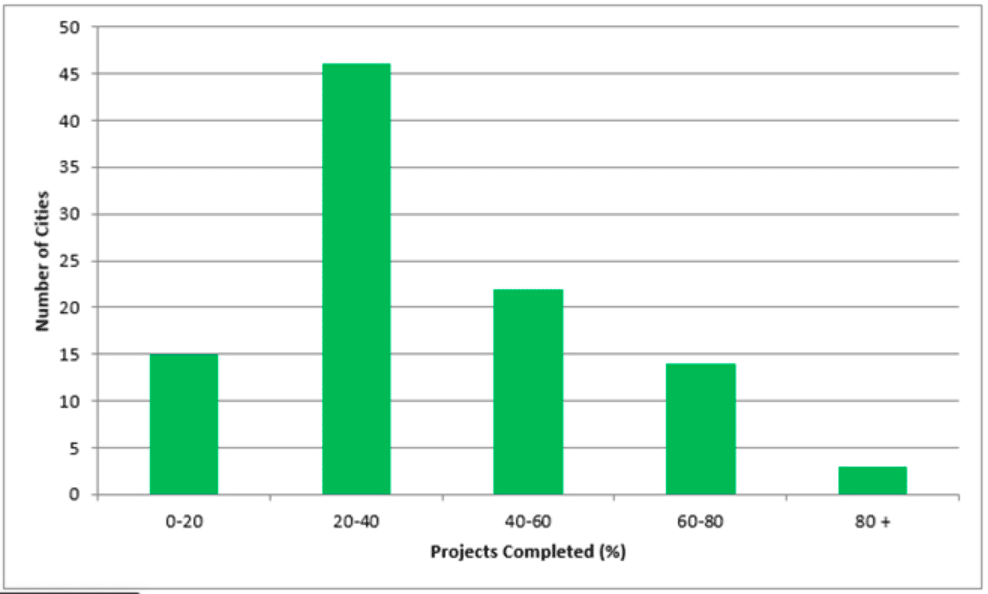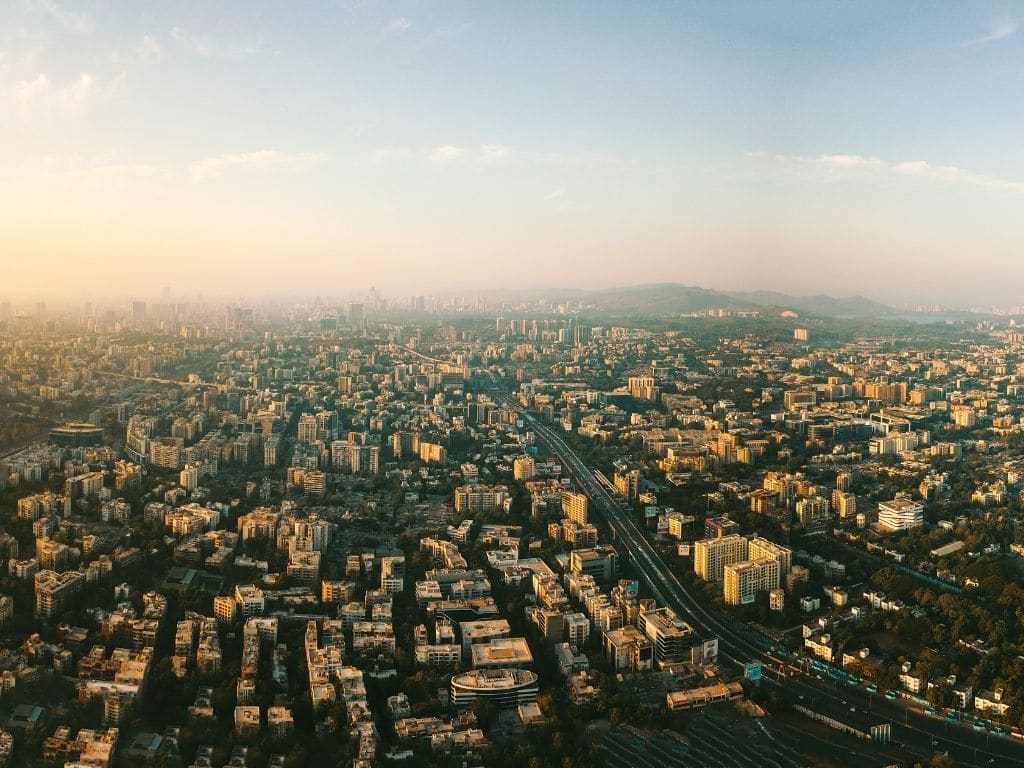With the launch of its urban renewal programme – the National Smart Cities Mission – in 2015, India has joined hundreds of countries around the world hopping on the bandwagon of developing smart cities. By investing in innovative smart technologies to develop green and sustainable urban hubs, India was aiming to build at least one hundred smart cities across the country. However, the project is not entirely going as planned. Here is what happened and what is next for India’s most important, yet incredibly challenging, mission.
—
What is a Smart City?
The trend of smart cities is on the rise. While global urbanisation continues to grow at a rapid pace, with experts estimating about two out of every three people in the world will live in cities by 2050, governments and wealthy entrepreneurs have started looking at solutions to tackle this unprecedented urban expansion. In recent years, they began investing millions of dollars in land acquisition to build new urban settlements from scratch. They have also started pouring money into innovative smart technologies to turn some of the world’s most avant-garde metropolises into more sustainable and efficient cities.
A smart city is a concept that sees the adoption of data-sharing smart technologies to upgrade energy efficiency, minimise the environmental footprint of urban hubs, and drastically improve the quality of life of its citizens. Among the smart technologies needed to make all of this possible are the Internet of Things (IOT) and information communication technologies (ICTs). These technologies are a fundamental piece of the smart city puzzle. Through them, it is possible to create and implement a series of efficient urban operations and services that ensure competitiveness and high quality of life while respecting economic, social, environmental, and cultural aspects.
The Importance of Smart Cities in India
Urbanisation is an integral part of the process of economic development. In India, the world’s second-most inhabited country with a population of nearly 1.4 billion people and almost one-quarter of them living in urban areas, cities are a major component of the country’s economy. They generate over two-thirds of its GDP and account for 90% of government revenues.
India is also home to three of the world’s 21 megacities: Mumbai, Delhi, and Kolkata, with a population of 19, 15, and 14 million people respectively. However, the country is also affected by huge issues that are slowing down urban development and the overall growth of the country’s economy. While an increasing number of people are migrating from rural to urban areas to seek economic opportunities, issues such as poor local governance and financing, a lack of infrastructures and services as well as inappropriate and archaic urban planning represent huge challenges that hinder the integration of migrants in cities. Consequently, the number of slums has risen to historic highs. According to the World Bank, slums now account for one-quarter of all urban housing and more than 35% of the urban population lives in these neighbourhoods. The growing urban population is also putting a huge pressure on resources like water and energy as well as overwhelming waste management services, public transport, education, and healthcare.
India’s Smart Cities Mission
To tackle this urban explosion, India is now betting on smart technologies. This new approach would allow the government to use its resources as well as plan its infrastructure development in a more sustainable and efficient way, not to mention improve overall city operations. On June 25, 2015, Prime Minister Narendra Modi announced India’s Smart Cities Mission, a project that aims to drive economic growth and improve the lives of urban citizens across the country by enabling local area development and harnessing smart technology. A total of one hundred cities in different states that are home to more than one-third of the country’s population have been selected to be turned into smart cities. Together, they have pitched over Rs. 2,00,000 crores (USD$26 billion) as their total investment budget to facilitate the realisation of more than 5,000 projects designed to improve their management and infrastructure.

Figure 1: India’s 100 Cities Selected Under the Smart Cities Mission
The strategy to transform these urban areas into smart cities comprises three phases:
- City improvement: area-based development to transform existing residential areas into better-planned neighbourhoods by retrofitting and redevelopment;
- City extension: greenfield projects to develop new areas that can accommodate the growing urban population;
- Pan-city development: improving existing city-wide infrastructure through thoroughly selected smart solutions.
The selected cities will have to provide socio-economic data on municipal services such as waste management, traffic flow as well as water and energy supply and usage. This will enable city planners to develop infrastructure- and service-related projects that can improve the quality of life for their residents, from health and education to IT connectivity and housing. The application of ‘smart’ solutions to overcome various urban issues is the main feature that distinguishes India’s Smart Cities Mission from previous urban-reform initiatives. However, collecting this data through smart technologies would require, first and foremost, a database on the ownership of property, something that has raised concerns over citizens’ privacy and security. In order to guarantee a transparent gathering and propagation of personal data, the government has been working on the Personal Data Protection Bill, despite not much progress being made since the bill was first discussed in Parliament in 2019.
Successes and Failures of India’s Smart Cities Mission So Far
Among the hundred Indian cities included in the Mission, India’s top 20 smart cities were selected by the Urban Development Ministry to be the first to receive financing for the implementation of smart projects. The first deadline for the completion of the projects across the selected cities was set between 2019 and 2023. However, it has since been postponed and slowed down in the wake of the COVID-19 pandemic.
Funding for the projects comes from different sources: while the biggest portion of investments comes from central and local governments, financing coming from the private sector is also vital. Indeed, with its crucial support, the Mission has successfully completed 228 projects across more than 60 cities. According to the Ministry of Housing and Urban Affairs, as of 2021, nearly 47% of the projects have been completed on a national level. For example, in 2020 the Indian government launched over 10,000 internships under The Urban Learning Internship Programme (TULIP) to offer learning opportunities to fresh graduates. Furthermore, in 2021 the government has implemented digital infrastructure and tools to ensure data availability and skill-building initiatives to create solutions for citizen-centric governance are being created under a National Urban Digital Mission (NUDM).
You might also like: Top 7 Smart Cities in the World and How They Do It
Among the leading cities for the number of finished projects are New Delhi, Chennai, and Indore, with over 80% of the projects fully completed. The projects implemented so far vary greatly. The city of Agra in the state of Uttar Pradesh, for example, is working on the implementation of a series of flagship projects ranging from micro-skill development to smart health centres and smart classes in two municipal schools that can drastically improve the quality of education. The southwestern city of Mangaluru is investing in renewable energy, installing solar panels across the city, something that will bring down electricity costs by up to INR 6 million (USD$ 78,000) over the next 25 years. Other cities are instead putting a lot of effort into smart security systems. For example, the city of Tumakuru, located in the southern part of the Karnataka state has developed a mobile app that directly connects citizens to the police to improve security in the city.

Figure 2: Project Completed in Cities up to 28 July 2021
However, not all of the Mission’s goals have been successful. In cities like Amaravati, Bhagalpur, Muzaffarpur, and Shillong, not a single project has been completed and it seems unlikely that the original six-year deadline, set when the Mission was launched in 2015, will be met. Some of the biggest challenges are related to management, with many city data officers inadequately trained to understand and analyse data and thus to provide adequate and effective solutions, as well as finance issues, with most state and local governments finding it challenging to mobilise enough funds and use them efficiently.
While the results of India’s Smart Cities Missions have been mixed so far, some very promising progress has been made across the country. In some cities, these have already significantly improved the quality of life of Indian citizens and there is no doubt that more projects will be completed in the coming year. As experts suggest, the Mission should be seen as a long-term programme rather than something that has to be completed in a few years. Others argued that there is a need to identify new projects to tackle some pressing issues that have yet to be addressed. Some examples include the lack of appropriate drainage systems across the country that are able to properly and safely manage rainwater during monsoon seasons, or the need for more training programmes for urban local bodies and personnel. Lastly, it is crucial that the government addresses privacy issues surrounding the collection and use of personal data by passing an adequate Personal Data Protection Bill.
You might also like: How Sustainable Cities like Singapore Succeed in Green Urban Development


















